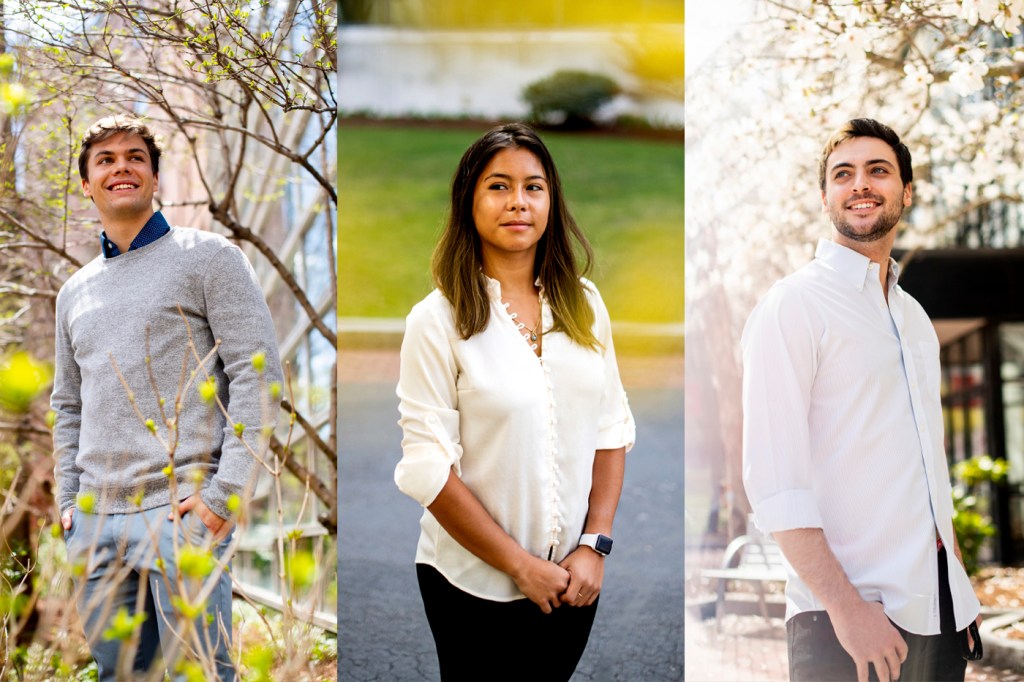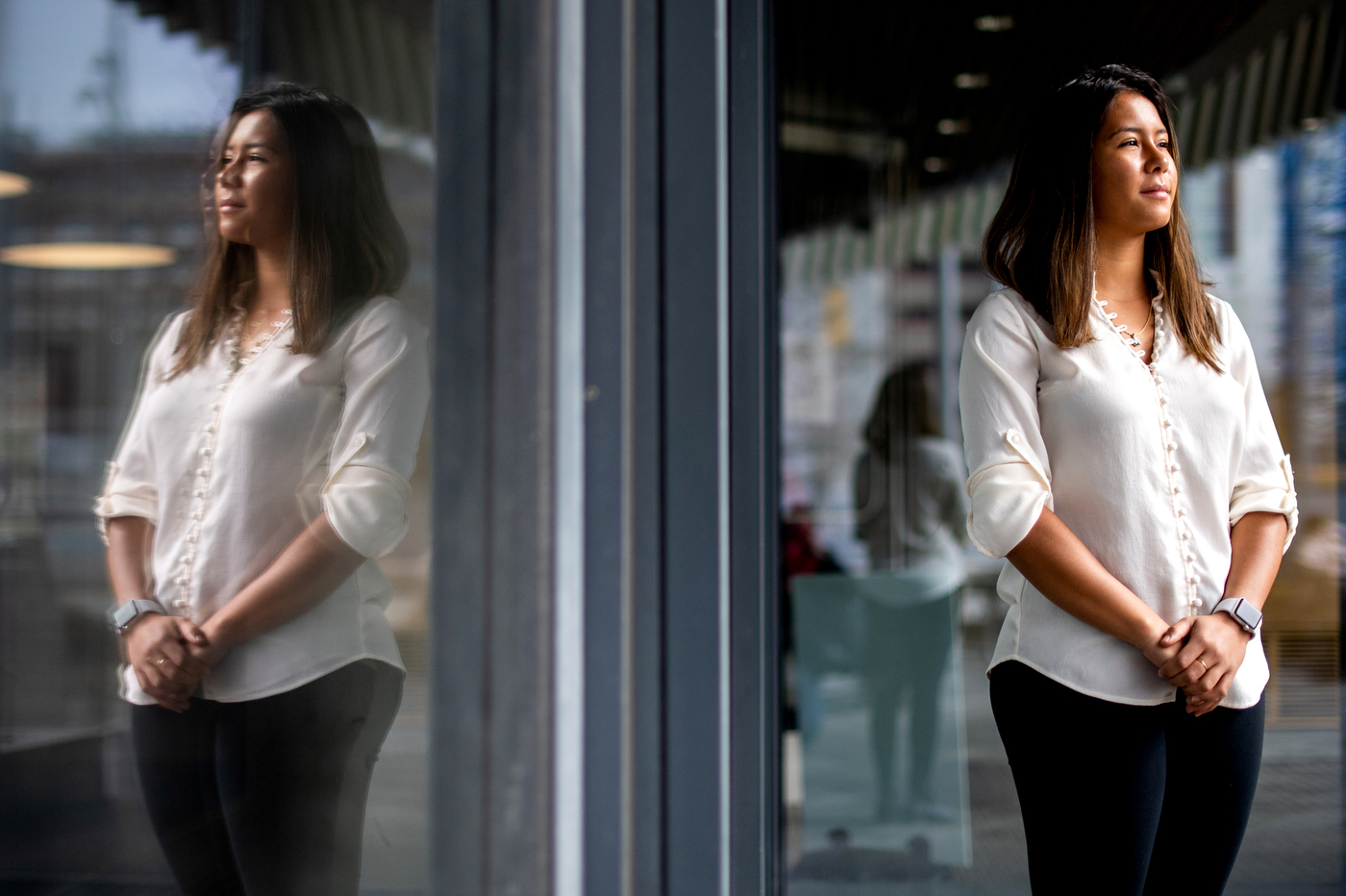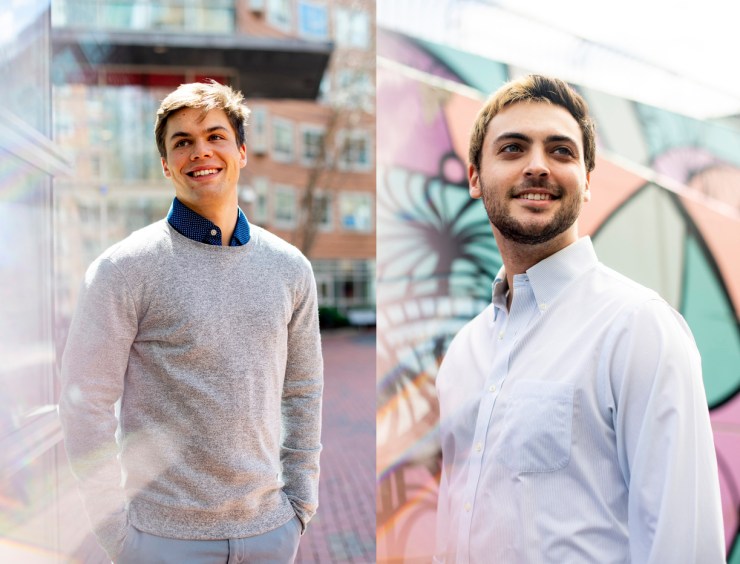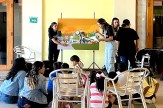Goldwater Scholarships go to 3 undergrads immersed in promising science

Three Northeastern students—Sabrina Bond, Spencer Lake Jacobs-Skolik, and Cameron Young—have been selected from a pool of more than 1,200 nominees to receive the prestigious Barry Goldwater Scholarship. This national, merit-based academic award is given to undergraduate sophomores and juniors who plan to pursue research careers in natural sciences, engineering, and mathematics.
Each of the three students selected for the award intends to earn both doctoral and doctor of medicine degrees. As undergraduates at Northeastern, they’ve each already participated in an impressive variety of research projects.

Sabrina Bond is working on a project to investigate the hypothesis that children and young adults with Autism Spectrum Disorder have trouble with prediction. Photo by Matthew Modoono/Northeastern University
Young has spent the last two semesters on co-op at Boston Children’s Hospital on a project tracking the emergence of multisystem inflammatory syndrome—a severe immune response that some children experience after contracting COVID-19. His team led a network of 70 medical centers across the country in collecting and analyzing patient data to better understand the disease and develop treatments. Their research was recently published in the Journal of the American Medical Association.
During his previous co-op, Young worked with a team at Boston’s Brigham and Women’s Hospital and the Massachusetts Institute of Technology, building devices to alleviate the negative effects of radiation therapy for cancer patients. The devices are designed to be inserted into a patient’s body and absorb excess radiation, protecting as much of the patients’ healthy tissue as possible.
“These were cool because they were personalized to the patient’s anatomy and 3D printed in real time as we contoured them on CT scans,” says Young, who is a junior majoring in chemical engineering and biochemistry.

Cameron Young, left, has spent the last two semesters on co-op at Boston Children’s Hospital on a project tracking the emergence of multisystem inflammatory syndrome. Spencer Jacobs-Skolik, right, is pursuing a career in biosignal processing—and already has two scientific publications under his belt. Photos by Ruby Wallau/Northeastern University
After applying for the Goldwater last year and not being selected, Young says he was particularly motivated to make the most of his research opportunities and thrilled to be awarded the scholarship this year. He plans to focus his career on cancer research.
“There is nothing usual about cancer. It’s an incredibly diverse group of diseases caused by so many different mechanisms. It’s a major challenge, which is why it’s been so difficult for people to treat and solve,” Young says. “The challenge of it is what really interests me. I like to try and answer hard questions, and there is no better field in medicine to do that than oncology.”
Jacobs-Skolik has known he wanted to pursue a career in scientific research since freshman year of high school, when he read a publication by researchers at Duke University who were able to wire an entirely new motor control pathway in a rhesus monkey, allowing the monkey to control a robotic limb.
Now a junior majoring in electrical engineering, Jacobs-Skolik is pursuing a career in biosignal processing—and already has two scientific publications under his belt. Working with a multidisciplinary team of Northeastern researchers, he came up with a novel idea for how to predict muscle movement, “with the eventual intention of using this to inform prosthetic control,” Jacobs-Skolik says.
The Movement Neuroscience Lab and Cognitive Systems Lab at Northeastern, where he’s been working, are interested in developing a more advanced prosthetic hand. To do that, “the name of the game is predicting what an amputee is intending to do with the hand that no longer exists,” Jacobs-Skolik says. His research was published earlier this year in the Journal of Human Kinetics.
Last semester, Jacobs-Skolik completed a co-op at Spaulding Rehabilitation Hospital, the teaching hospital for Harvard Medical School’s Department of Physical Medicine and Rehabilitation. His main project involved developing a new way to measure the movements of patients with spinal cord injuries. Current methods rely on placing markers on a patient, which requires them to stand for long periods of time.
“Many of them don’t have the stamina to stand up for that long,” Jacobs-Skolik says. “And when they’re tired, you’re not getting an accurate representation of what their walk looks like.” For the project, Jacobs-Skolik helped develop a series of algorithms that can predict and track human movement without the use of markers.
Bond, a sophomore majoring in behavioral neuroscience, is also interested in prediction. At the Action Lab at Northeastern, Bond is working on a project to investigate the hypothesis that children and young adults with Autism Spectrum Disorder have trouble with prediction.
“For some individuals with autism, they tend to be uncomfortable with social interaction because when they say something, they don’t know how you’re going to react,” Bond explains. Her lab has shown that in tests of throwing and catching a ball, children with autism perform well with throwing, but have a lower success rate with catching.
“We believe that their motor abilities are fine—what is impaired is their prediction,” Bond says.
With her major in behavioral neuroscience and minor in physics, Bond plans to combine her passion for space with her intuition for the field of biology, she says. She plans to pursue a career in medicine, specializing in the effects of microgravity on astronauts.
Bond says that winning the Goldwater Scholarship gave her a boost of motivation to continue in her field.
“Even though sometimes when I look around, I don’t see people who think like me or look like me, this gave me reassurance that I can do well in this field, and still be me.”





